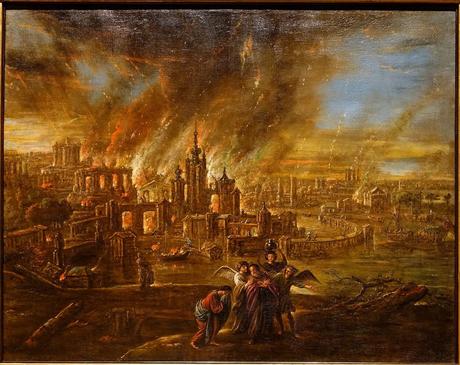Somebody really ought to write a book. It’s not me, but when new archaeological discoveries with large explanatory value emerge, they begin to paint an interesting picture. Archaeologists have determined that Tall el-Hammam, a city in Jordan of about 8,000 residents, was wiped out by a cosmic airburst, or meteorite. If you missed it in the headlines it may be because this happened in 1650 BCE. Barring volcanoes and other melting phenomena, since they don’t get hot enough, the cosmic airburst is the best theory. Given that Tall el-Hammam is not far from the Dead Sea, it has been posited that the sudden destruction of this city led to the biblical story of Sodom and Gomorrah. This makes sense to me. Just like the theory that the flooding of the Black Sea by the Mediterranean led to stories of the flood.
 Sodom and Gomorrah afire, by Jacob Jacobsz. de Wet; image credit: Daderot, public domain via Wikimedia Commons
Sodom and Gomorrah afire, by Jacob Jacobsz. de Wet; image credit: Daderot, public domain via Wikimedia CommonsPeople who had no other ways to explain such things would naturally consider them forms of divine punishment. Deep-seated guilt seems to be a universal of human psyches, sometimes for good reasons. In any case, an entire city wiped out by a meteorite looks like the finger of God just as much as lightning does. Biblical scholars have long supposed that the story of Sodom and Gomorrah was an etiology, or origin story, of the formation of the Dead Sea. This is partially based on the famous salt pillars, more than one of which bears the name “Lot’s wife” or the equivalent. And the Dead Sea is unlike any other body of water on the planet.
I suspect that over time other biblical stories may find logical explanations in ancient catastrophes. I haven’t found convincing those that try to explain the “plagues of Egypt” based on a scientific daisy-chain of events, although they are interesting. There’s no doubt that between the expulsion from Eden and the arrival of Moses there were dramatic events narrated by Genesis. If these were ghosts of memories of ancient tragedies that makes sense to me. They’re moralized, of course. Aesop’s Fables also ended with the moral of the story. We still like to know what a story means, and a good movie or novel will have some kind of message to convey. There’s no way to prove that Tall el-Hammam’s destruction led to the biblical account, or that memories of a catastrophic flooding of the Black Sea led to tales of arks. But still, somebody ought to write a book. I’d read it.
